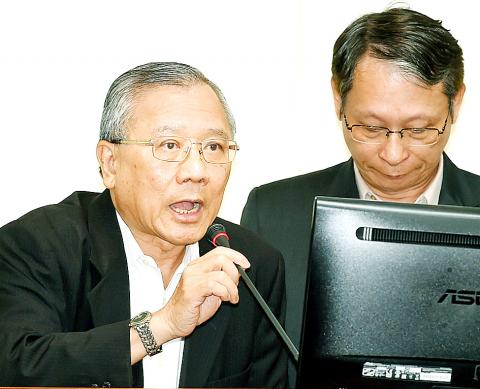CPC Corp, Taiwan (台灣中油) yesterday outlined provisions to compensate people affected by its substandard 95-octane unleaded gasoline containing unstable fuel additives.
The state-run refiner said motorists who had purchased the problematic fuel from gasoline stations operated by CPC or its franchisees from Oct. 1 to Saturday would be eligible for a full refund, adding that it would provide vouchers equivalent to the refund amount.
CPC chairman Tai Chein (戴謙) told lawmakers during a question-and-answer session at the Legislative Yuan’s Economics Committee that the compensation period would be extended by six months.

Photo: Fang Pin-chao, Taipei Times
The measure is expected to cost CPC more than NT$400 million (US$12.94 million), CPC said, citing estimates based on the 13,000 kiloliter of substandard gasoline that must be dealt with and at the latest fuel price of NT$31.5 per liter.
However, the incident’s total financial impact could be higher, as affected motorists are also eligible for reimbursements if the problematic gasoline had damaged their fuel tank sensors, although CPC said the problematic gasoline would not harm vehicle engines.
The refiner on Sunday said it would suspend sales of 95-octane unleaded gasoline at some of its stations in northern Taiwan, after gasoline supplied by its refinery in Taoyuan’s Gueishan District (龜山) failed to pass quality tests.
CPC found the substandard fuel stemmed from problems with fuel additives produced at the No. 2 catalytic reforming unit in the refinery.
As of 7pm yesterday, among the 102 affected gasoline stations in northern Taiwan, 55 had their fuel tanks filled with problem-free gasoline, while 47 were still awaiting remedy, CPC said.
Deputy Minister of Economic Affairs Tseng Wen-sheng (曾文生) has asked the refiner to submit a report on the incident before the end of this week.
Minister of Economic Affairs Shen Jong-chin (沈榮津) said that penalties resulting from the incident should aim at tightening lax protocols.

Sweeping policy changes under US Secretary of Health and Human Services Robert F. Kennedy Jr are having a chilling effect on vaccine makers as anti-vaccine rhetoric has turned into concrete changes in inoculation schedules and recommendations, investors and executives said. The administration of US President Donald Trump has in the past year upended vaccine recommendations, with the country last month ending its longstanding guidance that all children receive inoculations against flu, hepatitis A and other diseases. The unprecedented changes have led to diminished vaccine usage, hurt the investment case for some biotechs, and created a drag that would likely dent revenues and

Global semiconductor stocks advanced yesterday, as comments by Nvidia Corp chief executive officer Jensen Huang (黃仁勳) at Davos, Switzerland, helped reinforce investor enthusiasm for artificial intelligence (AI). Samsung Electronics Co gained as much as 5 percent to an all-time high, helping drive South Korea’s benchmark KOSPI above 5,000 for the first time. That came after the Philadelphia Semiconductor Index rose more than 3 percent to a fresh record on Wednesday, with a boost from Nvidia. The gains came amid broad risk-on trade after US President Donald Trump withdrew his threat of tariffs on some European nations over backing for Greenland. Huang further

Macronix International Co (旺宏), the world’s biggest NOR flash memory supplier, yesterday said it would spend NT$22 billion (US$699.1 million) on capacity expansion this year to increase its production of mid-to-low-density memory chips as the world’s major memorychip suppliers are phasing out the market. The company said its planned capital expenditures are about 11 times higher than the NT$1.8 billion it spent on new facilities and equipment last year. A majority of this year’s outlay would be allocated to step up capacity of multi-level cell (MLC) NAND flash memory chips, which are used in embedded multimedia cards (eMMC), a managed

CULPRITS: Factors that affected the slip included falling global crude oil prices, wait-and-see consumer attitudes due to US tariffs and a different Lunar New Year holiday schedule Taiwan’s retail sales ended a nine-year growth streak last year, slipping 0.2 percent from a year earlier as uncertainty over US tariff policies affected demand for durable goods, data released on Friday by the Ministry of Economic Affairs showed. Last year’s retail sales totaled NT$4.84 trillion (US$153.27 billion), down about NT$9.5 billion, or 0.2 percent, from 2024. Despite the decline, the figure was still the second-highest annual sales total on record. Ministry statistics department deputy head Chen Yu-fang (陳玉芳) said sales of cars, motorcycles and related products, which accounted for 17.4 percent of total retail rales last year, fell NT$68.1 billion, or